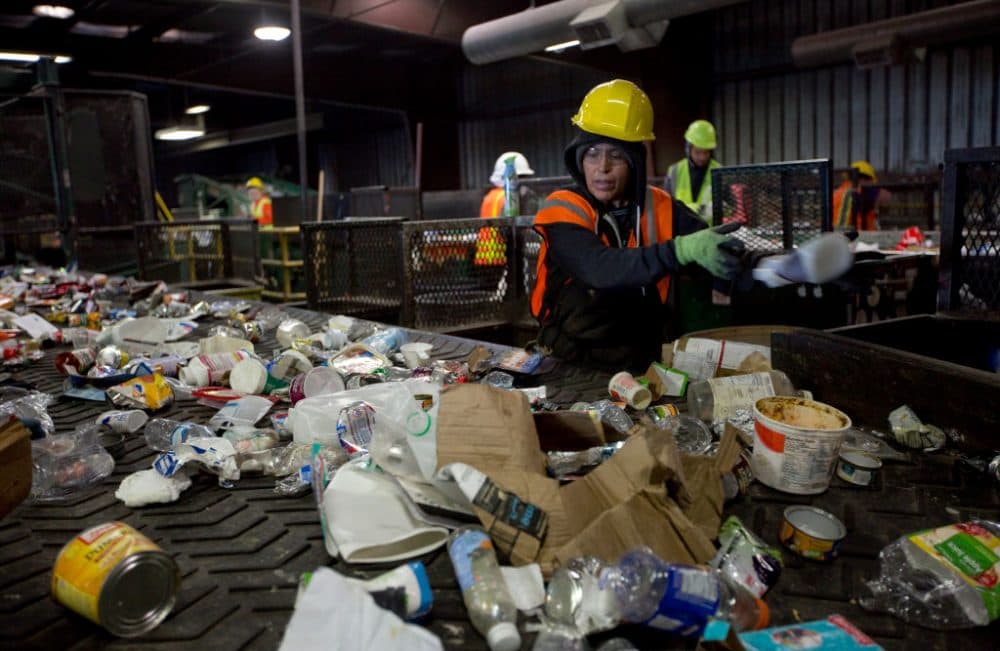Advertisement
What China's Foreign Waste Restrictions Mean For Recycling In The U.S.
Resume
At the start of the year, China placed restrictions on imports of 24 kinds of solid waste from other countries. China has been the world's largest importer and recycler of plastic, paper and scrap metal, so the restrictions, set to take full effect March 1, will have wide-reaching impacts.
Here & Now's Jeremy Hobson talks with Kate O'Neill (@kmoneill2530), associate professor of global environmental politics at the University of California Berkeley.
Interview Highlights
On what happens to plastic bottles recycled in the U.S.
"The figures that we have suggest that about half of the plastic waste that we throw away in recycling bins will wind up in a container ship on its way to China. For lots of reasons, one of which is that we have not very much infrastructure here in this country to actually recycle them effectively, especially the lower quality kinds of plastics. Another reason is that China has huge demand for any kind of scrap or other recyclable materials to feed its industry. We just don't have the markets. And the third reason is that the shipping is really cheap. The waste and the scrap simply go back in the holds of the container ships that bring all the consumer goods to us from China. [China] takes in well over half of the world's plastic and paper scrap, at least, and actually a pretty high percentage of copper, aluminium and a couple of other of the high-quality metals."
"I think they feel that taking in the world's garbage is something that a leading world power should not be doing."
Kate O'Neill, on why China wants to restrict waste imports
On why China wants to change that process
"It's been getting a lot of [foreign waste], and a lot of it has been dirty or contaminated or mixed. Different kinds of plastic, or paper, or scrap mixed together makes it very hard to deal with. It's very low quality. On the whole, they're certainly keeping some of the high-quality scrap, but China is also trying to really amp up its image on the global stage. We've seen this happen in climate change, and now we're seeing it a little bit more generally, and I think they feel that taking in the world's garbage is something that a leading world power should not be doing."
On what's going to happen to all that waste now
"That's the hard question. At the moment, one big trend is happening, which is that the waste is going to other countries in Southeast Asia. China's been slowing down on this for a few years now, and if you look at the data, Malaysia, for instance, has really spiked its imports. I think Vietnam, maybe Indonesia — countries that are starting to take it in, and frankly we don't know what's happening to it there. China we actually had more of an idea. Here, I think we're seeing municipal authorities starting to really crack down on what kinds of plastics they take. That's going to lead to more diversion to landfill. Over the longer term, there are a bunch of organizations — not just government ones, but also private — who are trying to fund the building of new infrastructure. And, in a strange twist, I was reading something yesterday that apparently Chinese scrap recyclers are coming to the States to see if they can build recycling plants here."
On building recycling facilities in the U.S.
"We, frankly and rightly so, have more regulations about these sorts of plants, and it's expensive here, it's expensive to site it. And the low-quality plastics are very hard to turn into anything useful. Plastic downgrades very quickly in the recycling process, so while the rigid plastics, the clean plastics can be turned easily into other things, lower quality plastics — much harder to figure out what they would be used for, especially given that we don't have necessarily all of the demand or the markets for it in this country."
On whether China's restrictions could change plastic production and consumption in other parts of the world
"I really hope so. There are campaigns building right now, as they have around plastic water bottles, but plastic bag bans. And the campaign that I'm really kind of watching and enjoying right now is raising awareness and finding alternatives for single-use plastic straws. I think people are becoming much more aware of the plastics that they use on a daily basis, slowly but surely. One of the big issues that's really highlighted this for a lot of people is the issue of plastic waste in the oceans that we are largely responsible for, and I think it's raising a lot of alarm worldwide."
This article was originally published on January 22, 2018.
This segment aired on January 22, 2018.